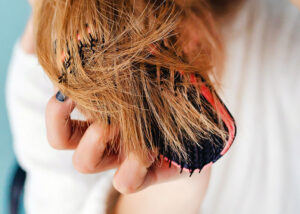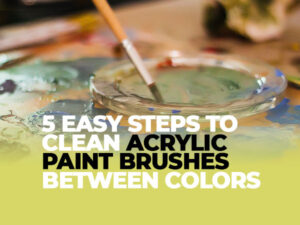Painting can be a rewarding and enjoyable activity, but tidying up afterwards can be quite the chore – particularly when it comes to cleaning paint brushes. Not only is it essential to clean your paint brushes after each use to preserve their quality and longevity, but it also guarantees you can achieve optimal results when you reuse them again in the future.
One effective and affordable way of cleaning paint brushes is with vinegar; an inexpensive yet highly effective option! Vinegar is an effective cleaning agent that can dissolve paint residues, soften bristles, and lift stubborn stains from brushes.
In this article, we’ll walk you through the step-by-step process for cleaning paint brushes with vinegar as well as provide some tips and tricks to ensure optimal results. Whether you’re a professional artist or DIY enthusiast, let’s get started on learning how to properly clean paint brushes using vinegar.
The Benefits of Cleaning Paint Brushes with Vinegar
Cleaning your paint brushes with vinegar has several advantages, such as:
- Vinegar is cost-effective: When compared to commercial paint brush cleaners, vinegar is a much more budget friendly solution.
- Environmentally-Friendly: Vinegar is an all-natural and non-toxic cleaner, making it a safe choice for both the environment and your health.
- Versatile: Vinegar can be used to clean a variety of paint types, both oil-based and water-based.
- Effective: Vinegar can dissolve and remove paint residue from brush bristles, restoring its shape and quality.
- Softens Bristles: Vinegar can help soften and condition the bristles, making them easier to work with and less likely to break or fray.
- Removes Stains: Vinegar can also effectively eliminate stubborn stains and residue from paint brushes, such as dried paint or other particles.
- Easy to Use: Cleaning paint brushes with vinegar is an effortless and straightforward process, requiring only a few common household items.
Overall, cleaning paint brushes with vinegar is an economical and sustainable alternative to commercial cleaners, providing a cost-effective, environmentally friendly solution for maintaining the quality and longevity of your brushes.
Step-By-Step Guide to Cleaning Paint Brushes with Vinegar
Cleaning paint brushes is an easy and efficient process that can help restore the quality and extend the life of your brushes. Here is a step-by-step guide on cleaning your brushes using vinegar:
Step 1: Gather Your Materials
Before beginning to clean your paint brushes with vinegar, you’ll need a few items. These include white vinegar, a clean jar or container, paper towel or cloth and sink or basin.
Step 2: Remove Extra Paint
To maximize efficiency during the cleaning process, utilize a paper towel or cloth to scrape away excess paint from the brush. Doing this makes the vinegar penetration of all areas of the bristles much better and will allow for thorough coverage with each pass.
Step 3: Soak the Brush in Vinegar
Place the brush into a clean jar or container and pour enough white vinegar over its bristles to completely cover them. Make sure the vinegar covers every area of the bristle, including its ferrule (metal part that holds them together).
Step 4: Soak the Brush
Soak your brush in vinegar for at least 30 minutes or overnight for more stubborn paint residue. This will help loosen the paint and dissolve any remaining particles.
Step 5: Rinse the Brush
After soaking, take your brush out of the vinegar and rinse it thoroughly with warm water. Use your fingers to gently work the bristles in order to make sure all traces of paint and vinegar have been washed away.
Step 6: Dry the Brush
After thoroughly rinsing the brush, gently shake off any excess water and use a paper towel or cloth to dry its bristles. Avoid using heat sources such as hair dryers or other heat sources which could damage them.
Step 7: Reshape the Bristles
Once the brush has dried, gently reshape its bristles with your fingers to restore their original shape. Doing this helps preserve the quality and shape of the bristles for future use.
By following these simple instructions, you can effectively clean your paint brushes with vinegar and extend their life. Remember to always store them properly after cleaning to prevent damage and maintain their quality.
How Long to Soak Paint Brushes in Vinegar for Optimal Cleaning
The duration of time your brushes should be soaked depends on the type of paint and amount of buildup on their bristles. As a general guideline, it’s recommended that they soak for at least 30 minutes for effective removal of dirt and grime.
Water-based paints such as acrylic or latex require only 30 minutes of soaking in vinegar to loosen the paint and dissolve any leftover residue. Oil-based paints may take longer to dissolve and remove, so for best results it’s recommended that brushes stay submerged in vinegar overnight.
It is essential to remember that leaving brushes in vinegar for too long can damage their bristles. Therefore, check the brushes periodically while soaking and remove them once paint residue has softened enough to be removed easily.
If the brushes are heavily caked with paint or the bristles have dried on, additional steps may be required for effective cleaning. In such cases, use a stiff brush or comb to gently scrape away any leftover residue from the bristles before soaking them in vinegar.
Overall, soaking paint brushes in vinegar for at least 30 minutes is an effective way to clean them and preserve their quality. However, the duration should be adjusted depending on the type of paint and amount of buildup on the brushes to guarantee optimal cleaning and prevent bristle damage.
Tips for Cleaning Paint Brushes with Vinegar
Vinegar can be an efficient and economical way to remove paint residue without damaging the bristles of your brushes. Here are some tips that will help you clean your brushes while minimizing the risk of damage:
Use white vinegar: White vinegar is an ideal cleaning agent that’s gentle on paint brush bristles. Steer clear of apple cider vinegar or any other type of vinegar that may contain impurities or additives.
Avoid Boiling or Hot Water: Boiling or using hot water to clean paint brushes can cause the bristles to expand and weaken, potentially leading to damage or breakage. Instead, use warm water for rinsing after soaking the brushes in vinegar.
Be careful not to leave paint brushes in vinegar for too long: Although vinegar is a mild acid, leaving paint brushes exposed can damage their bristles. Make sure you check on them periodically while soaking, and remove them once any paint residue has softened enough to be easily removed.
Use a soft brush to remove paint residue: Before soaking your brushes in vinegar, gently scrape away as much excess paint with either a soft brush or cloth. Doing this helps reduce the amount of residue that needs to be dissolved by the vinegar solution.
Rinse Thoroughly: After soaking your brushes in vinegar, rinse them thoroughly with warm water to remove any remaining vinegar and paint residue. Use your fingers to gently work the bristles, making sure all traces of paint and vinegar have been washed away.
Reshape the Bristles: Once your brush has been cleaned, gently reshape its bristles with your fingers to restore their original shape. Doing this helps preserve its quality and shape for future use.
By following these tips, you can effectively clean your paint brushes with vinegar without risking damage to their bristles. Be sure to store them securely after each cleaning in order to prevent further harm and keep their quality intact.
Vinegar Alternatives for Cleaning Paint Brushes
Vinegar is an efficient and budget-friendly way to clean paint brushes, but some people may prefer other methods. Here are some vinegar alternatives for cleaning paint brushes:
Fabric Softener: Fabric softener can be used as a brush cleaner, as its softening agents help break down and dissolve paint residue. Mix one tablespoon of fabric softener with one cup of warm water and soak your brushes for about 30 minutes; rinse thoroughly with warm water and reshape the bristles as necessary.
Dish soap: Dish soap is another effective solution for cleaning paint brushes. Mix a small amount of dish soap with warm water and soak the brushes for about 30 minutes, then rinse thoroughly with warm water and reshape their bristles.
Lemon Juice: Lemon juice is an effective natural acid that can break down and dissolve paint residue. Soak brushes in lemon juice for about 30 minutes, then rinse thoroughly with warm water.
Rubbing Alcohol: Rubbing alcohol is an effective solvent that quickly dissolves paint residue. Soak the brushes in rubbing alcohol for around 30 minutes, then rinse thoroughly with warm water.
Commercial Brush Cleaners: Commercial brush cleaners are available on the market specifically designed to clean paint brushes. While these may be more expensive than homemade alternatives like vinegar or baking soda, they can be highly effective and may contain conditioning agents which help preserve bristle quality.
By using these vinegar alternatives, you can effectively clean your paint brushes without using vinegar. However, be aware that some of these alternatives may be harsher on brush bristles than vinegar; thus, be sure to follow the manufacturer’s instructions and test the cleaner on a small area before using it on the entire brush.
How to Maintain the Quality of Paint Brushes by Regularly Cleaning Them with Vinegar
Regularly cleaning your paint brushes with vinegar can help preserve their quality and extend their lifespan. Here are some tips on how to do so:
Avoid Brush Dryout: Be sure to clean your brushes promptly after each use, as leaving paint on them can cause the bristles to harden and lose shape. Instead, follow our step-by-step guide for cleaning paint brushes with vinegar for optimal effectiveness.
Rinse thoroughly: After cleaning your brushes with vinegar, be sure to thoroughly rinse them with warm water to eliminate any remaining vinegar and paint residue. Doing this helps avoid vinegar residue from damaging the bristles over time.
Reshape the Bristles: After cleaning and rinsing your brushes, gently reshape their bristles with your fingers to restore their original shape. Doing so helps preserve the quality and shape of the bristles for future use.
Dry Brushes Properly: After cleaning your brushes, it is essential to properly dry them to protect their bristles. Gently shake out any excess water and lay the brushes flat on a clean towel to air dry. Avoid standing brushes upright in a jar or container as this could cause water accumulation at the base of the bristles, damaging the glue holding them together.
Store Brushes Properly: After your brushes have dried, store them in a clean and dry location with their bristles facing up. Avoid keeping them in sealed containers or locations that could be crushed or bent as this can cause damage to their bristles.
By regularly cleaning your paint brushes with vinegar, you can maintain their quality and extend their lifespan. Be sure to store them properly after each cleaning for maximum protection against damage and to preserve their brilliance.
Conclusion
In conclusion, cleaning paint brushes with vinegar is an economical and efficient way to rid them of paint residue and preserve their quality. Following our step-by-step guide and soaking your brushes for the recommended amount of time will enable you to effectively clean your brushes without damaging them.
Furthermore, regular maintenance with vinegar will extend their lifespan and help save you money on new brushes. If you prefer an alternative method, vinegar alternatives can also effectively clean paint brushes. Just be sure to rinse, reshape and dry your brushes properly in order to avoid damage and maintain their quality.




